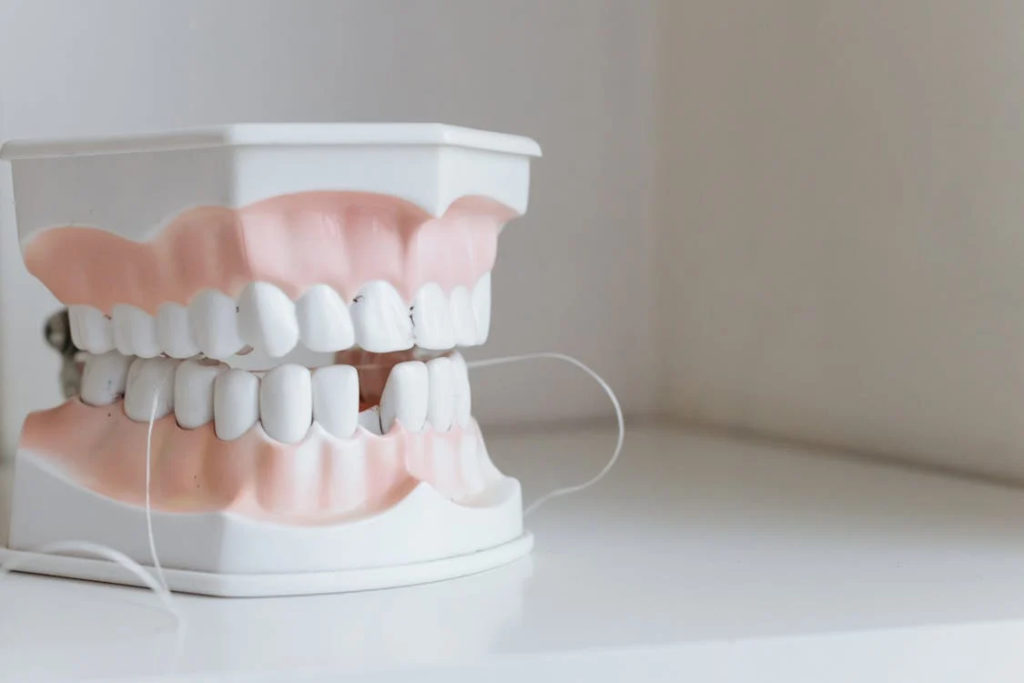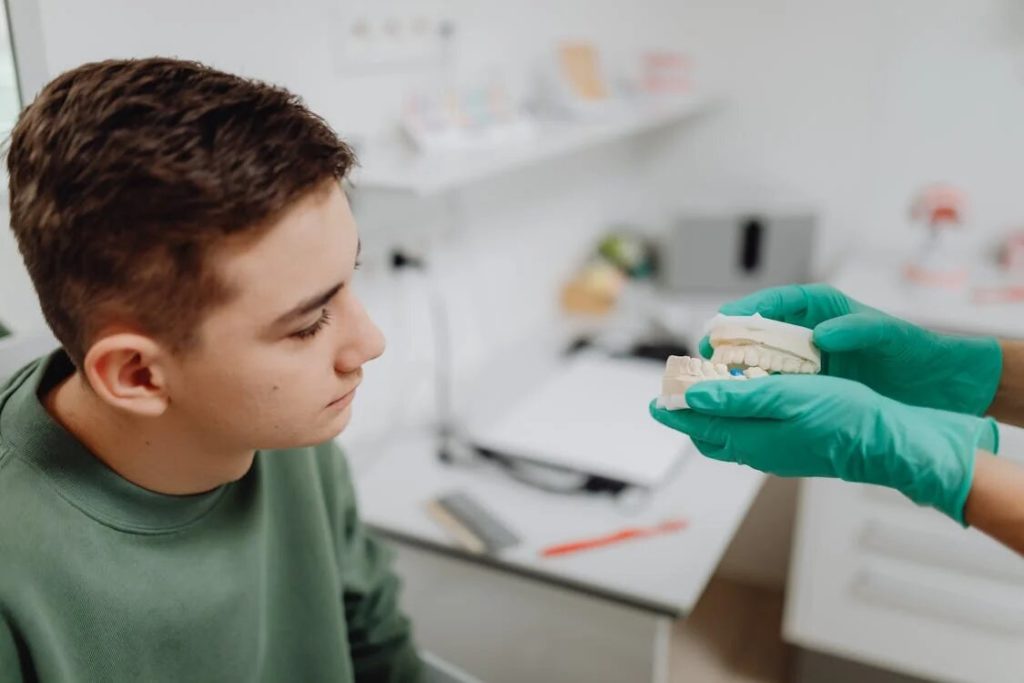In the UK, about 6% of adults are edentulous, having lost all of their natural teeth.
Losing teeth can be traumatic, but dentures can help. They can restore your smile, help you chew and speak properly, prevent further dental issues, and regain confidence.
However, with various options available, choosing the right denture can feel overwhelming.
This article will walk you through everything you need to know about finding the right dentures, from different types to factors you need to consider and more.

Different Types of Dentures
Have you decided to get dentures? Congratulations on taking a major step toward a more confident smile. Before you get your dentures, you need to determine what type to choose.
Five types of dentures are available, each made from different materials, such as acrylic resin, porcelain, and flexible polycarbonate, and suited for different needs.
Let’s explore the different types of dentures, including their pros and cons.
Full Dentures
Also called complete dentures, full dentures are used to replace the full set of teeth in either the upper or lower jaw or both.
They’re custom-made to fit the shape of jawbone and gums and are designed specifically to resemble natural teeth.
Since no teeth are left to anchor them, full dentures rest directly on the gums. Also, you can easily remove them when required.
Pros
- Suitable for individuals who have lost all their teeth.
- Improved appearance and function compared to having no teeth.
- Relatively affordable.
Cons
- It may feel bulky and less stable compared to natural teeth.
- Require periodic adjustments as the shape of the gums and bone changes over time.
Partial Dentures
Unlike full dentures, partial dentures are used when some teeth are missing. They enable you to support the existing teeth and use them as anchors.
Partial dentures are made from either acrylic or cobalt chrome (metal), which is lighter, stronger, and less bulky than acrylic ones but may cost you more.
Based on your preferences and needs, these dentures can either be fixed or removable.
Removable dentures can be taken out and cleaned daily. They include replacement teeth on a gum-coloured base, held in place by a metal framework that clips onto your natural teeth to offer support and stability.
They are cost-effective, helping you chew, speak, and improve your appearance.
On the contrary, fixed bridge dentures are attached permanently to your natural teeth on either part of the gap. They are more secure and stable than removable dentures. Fixed bridge dentures are more expensive.
No matter which type of partial denture you choose, looking after them properly is important.
Pros
- Preserve the remaining natural teeth and prevent them from shifting.
- Generally more comfortable and stable than full dentures.
- Easy to clean and maintain.
Cons
- Visible metal clasps can affect appearance.
- It may require proper cleaning to avoid plaque buildup around the attachments.
Immediate Dentures
When damaged or unhealthy teeth are removed, your dentist can put in immediate dentures the same day to restore your smile immediately.
Immediate dentures are placed in the mouth right after removing the remaining teeth. Custom-made to best align with your jawbone and gums, they can be partial or complete dentures.
These dentures help you maintain the function and appearance while the gums heal and your permanent dentures are prepared.
Pros
- Provide immediate tooth replacement, which can help with appearance and function right after tooth extraction.
- Protect the gums during the healing process.
Cons
- Often requires more adjustments and relining as the gums and bone shrink during healing.
- Typically more expensive due to additional adjustments and relining.
- Shorter lifespan compared to other denture types.
Overdentures
Also called hybrid or tooth-supported dentures, overdentures rest on gums but are held in place by dental implants. Although they’re typically full dentures, partial ones are also available.
They can be removable, such as snap-in dentures, or permanent, supported by a gum-implanted metal bar or implants.
Unlike most other dentures, overdentures do not dislodge easily. It allows you to bite hard foods without much hassle. They’re also secure and natural-looking, which can enhance confidence.
However, getting overdentures involves a complex dental procedure.
Pros
- Increased stability and comfort compared to traditional full dentures.
- Help preserve the jawbone and reduce bone loss.
- Improved chewing efficiency.
Cons
- Requires more dental visits and maintenance.
- Higher initial cost compared to traditional dentures.
Implant-Supported Dentures
Implant-supported dentures are anchored to dental implants surgically placed in the jawbone. They are also called snap-in dentures because they snap on the implants.
These dentures can be partial or complete and are meant to be more secure and stable than traditional denture types. Implant-supported dentures include replacement teeth on a gum-coloured base that snaps onto abutments on a dental implant.
With snap-in dentures, you can speak and chew more comfortably. They even feel and appear similar to natural teeth, giving you more reason to feel confident and improve your self-esteem.
However, like overdentures, implant-supported dentures are more costly and require more dental procedures.
Pros
- Superior stability and comfort.
- Better chewing ability and speech.
- Help preserve jawbone and facial structure.
Cons
- More expensive than other denture options.
- Involves a surgical procedure and a longer healing period.
Now that you know what types of dentures are available, let’s explore how to find the right dentures for you.

Factors To Consider: How To Choose The Right Denture
Dentures have long been used to replace missing teeth and restore your attractive smile. Choosing dentures can be challenging with so many options, especially if you’re unfamiliar with them.
Here are a few factors to consider to choose the best option.
Oral Health Condition
The state of your oral health plays a crucial role in deciding the type of denture suitable for you.
For instance, partial dentures might be the best option if you have healthy remaining teeth. In contrast, implant-supported dentures could be considered if your gums and bone structure are healthy.
Lifestyle And Diet
Another factor you must take into account is your dietary habits and lifestyle.
If you lead an active lifestyle, participate in various sports activities, and enjoy a variety of foods, including tougher items such as nuts and meats, you should choose a more secure option like implant-supported dentures.
Full and partial dentures may require dietary adjustments to prevent damage to the prosthetic.
Budget
Dentures vary significantly in cost due to various factors, such as materials used, etc.
While full and partial dentures are affordable, implant-supported dentures can be expensive due to the surgical procedure involved.
It’s essential to discuss with your dentist and insurance provider to understand what costs are covered and what you may need to pay out of pocket.
Aesthetics and Comfort
One of the most important things to consider is the fit and aesthetics of your denture.
A properly fitting denture will ensure you can eat and talk comfortably without mouth irritation or discomfort. Moreover, good dentures shouldn’t appear fake.
Custom-made dentures should match the shape, size, and colour of your natural teeth. Ideally, high-quality custom dentures should look like your natural smile.
Implant-supported dentures and overdentures typically offer a more natural look and feel than traditional full or partial dentures.
Durability and Maintenance
Dentures are a significant investment, and their longevity depends heavily on the materials used and the care routine.
Nevertheless, implant-supported and overdentures are the most durable options. They can easily last 10-20 years with less frequent replacement. In contrast, full and partial dentures need regular care and typically last 5-10 years.

Consulting With a Dental Professional
While having an idea of the dentures you need is a good start, it’s not sufficient. If you wish to get a perfect set, a denture consultation is necessary.
They will examine your gums and teeth to determine the most suitable type of dentures for your needs. In addition, a denture professional will consider your budget and lifestyle to align your choices with your preferences better. They can also guide you through different options and offer alternatives if required.
Here’s a list of questions you can ask your denture professional:
- What type of denture do you recommend for my situation and why?
- What are the costs involved for each option?
- How long will the process take, from initial fitting to final adjustments?
- What maintenance will be required for my dentures?
- Are there any risks or potential complications with the recommended dentures?
Smile Freely With Menston Dental
Consider dentures if you have broken or missing teeth that affect your confidence. They can help you eat, speak, and improve your self-esteem and oral health.
Make sure to consider each factor so you can find the best denture. Your dentist can help you find the best type for your needs and budget if required.
For a consultation, visit Menston Dental. We offer Natural Dentures, made to fit perfectly and look natural. Call us at 0345 548 8001 or email us today to schedule your appointment.

